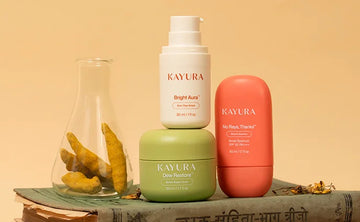
Barrier repair creams are everywhere. From Instagram buzz to beauty blogs, they’ve quickly become a skincare essential. And if your skin feels constantly reactive, red, flaky, or breaking out for no clear reason, the hype might actually be justified. It’s not always your products; it could be your skin barrier. And when that barrier is weakened, even the gentlest routine can feel like too much. That’s when a good skin barrier repair routine, and especially the best barrier repair cream, can be a game-changer.
What Is the Skin Barrier?
Your skin barrier is your body’s built-in defense system. It’s the outermost layer of your skin. Made up of lipids, natural oils, and skin cells, it keeps moisture in and harmful irritants like pollution, bacteria, allergens, and harsh chemicals out. But when this barrier is compromised by things like over-cleansing, harsh exfoliants, extreme weather, or too many actives, it starts to lose its ability to protect you. Moisture escapes, irritants sneak in, and inflammation becomes a constant cycle. That’s when skin barrier repair becomes critical.
Why the Barrier Breaks (And How to Know If Yours Has)
Even the healthiest skin can suddenly start acting out. And more often than not, your barrier is behind it. From over-cleansing and layering too many actives to harsh exfoliants or cold, dry weather, everyday habits can quietly erode its strength. These small stressors slowly chip away at your skin’s ability to hold onto moisture and keep irritants out.
And when your barrier starts to struggle, your skin doesn’t stay quiet about it. Maybe your usual products suddenly sting. Maybe you’re breaking out in places that were always clear. Maybe you’re seeing random dry patches or redness that won’t quit.
It’s easy to dismiss these changes as “sensitive skin,” but they’re often signs of a compromised barrier in need of barrier repair cream for sensitive skin or the best skin barrier cream designed for daily use.

Signs You Need a Barrier Repair Cream:
- Redness or blotchiness: A clear indicator of inflammation—look for a cream for skin redness or a cream for irritated skin to calm and soothe.
- A burning or stinging sensation after applying products: This means your barrier is compromised and reacting even to gentle skincare; switch to gentle skincare for sensitive skin or a barrier cream for the face.
- Flaky patches or rough texture: These are signs your skin lacks moisture and balance, an ideal time to use a flaky skin face treatment or a repair skin barrier cream.
- Breakouts in areas that are usually calm: Often mistaken for acne, but could be barrier-related irritation; try the best cream for inflamed skin or eczema-friendly moisturizer.
- That feeling that nothing works anymore: If your usual skincare suddenly fails, your barrier may be damaged, so reach for the best product for skin barrier repair, or a damaged skin barrier cream.
If this sounds familiar, chances are your barrier is calling for help. The good news? It’s fixable. All you need is a good skincare regimen to restore the skin barrier, starting with the right repair skin barrier cream.

How Does a Barrier Repair Cream Actually Repair a Damaged Skin Barrier?
A barrier repair cream is not just a basic moisturizer. It is designed to restore the core structure of your skin. A good cream for skin barrier repair helps prevent ongoing moisture loss while replenishing the building blocks your skin needs to function properly, like ceramides, fatty acids, and cholesterol. These ingredients work by strengthening the structure that holds your skin cells together, the part of your barrier that locks in moisture and keeps irritants out.
If you’re struggling with inflammation, dryness, or sensitivity, choosing the best cream for inflamed skin or the best cream for a damaged skin barrier can bring lasting comfort.
What Makes These Barrier Repair Creams So Effective?
It all comes down to formulation. The best epidermal repair cream formulas are made with skin-identical ingredients that mimic what healthy skin produces naturally, so they’re easily recognized and absorbed. Think ceramides, cholesterol, squalane, peptides, and calming botanicals. These creams should also be non-comedogenic, dermatologically tested, and gentle skincare for sensitive skin.
On the flip side, the right formula avoids anything that could further stress the skin, like drying alcohols, synthetic fragrance, or strong exfoliating acids — key ingredients to avoid for eczema and sensitive skin types.
Kayura’s Dew Restore™ Barrier Repair Cream: A Game Changer
Dew Restore™ Barrier Repair Cream goes beyond these basics. While many barrier creams focus solely on hydration or ceramides, this formula takes a more intelligent, skin-responsive approach. It combines skin-mimicking peptides for deep repair with proprietary Phytoblends: plant-based complexes extracted, tested, and perfected by phytoscientists for maximum impact. It’s one of the best products for skin barrier repair and an eczema-friendly moisturizer.


Key Bioactive Blends Inside Dew Restore™ Barrier Repair Cream:
- Oligopeptide-86: Supports skin regeneration and strengthens the skin barrier at a cellular level for long-term repair.
- Ceramide Complex: Reduces flakiness and reinforces the skin barrier without adding heaviness or clogging pores.
- Magnesium PCA: Delivers long-lasting hydration while boosting the skin’s natural resilience and moisture retention.
- Golden Shower Flower, Silymarin Seed & Holy Basil Extracts: A powerful botanical blend to calm inflammation, reduce visible redness, and protect against environmental stressors.
- Mango Seed Butter: A lightweight, non-comedogenic alternative to shea or cocoa butter—deeply nourishes without greasiness or pore blockage.
This is what gives our barrier repair cream its 24-hour hydration. Each component is designed for bioavailability and optimal skin absorption, so your skin doesn’t just receive ingredients, it recognizes them, absorbs them, and puts them to work exactly where they’re needed.
And with its National Eczema Association (NEA) Seal of Acceptance™, it’s also trusted by dermatologists and approved for even the most sensitive, reactive, or eczema-prone skin. If you're looking for an NEA-approved cream, Dew Restore ticks all the boxes: dermatologist-approved barrier cream, eczema-safe skincare products, fragrance-free barrier cream, and moisturizer without essential oils.
The Simpler Way Forward
Your skin doesn’t need more. It needs the right support. A damaged barrier can throw everything off, but the path back is simple and proven. With the right ingredients, the right formulation, and consistent care, healthy skin follows. Whether you're searching for the best moisturizer for eczema-prone skin or a damaged skin barrier cream, barrier creams like Dew Restore™ provide the ultimate support.
FAQs About Barrier Repair Creams













